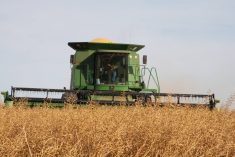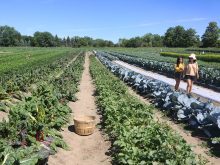Canada’s lone organic accreditation agency has its first customer and is about to get number two.
The Standards Council of Canada’s clients are two of the largest organic certifiers operating in the country.
Some say it’s a sign the issue of national accreditation is finally sorting itself out.
“I think it’s a step forward,” said Neil Strayer, general manager of Growers International Organic Sales Inc., an organic grain trading company based in Belle Plaine, Sask.
The organic industry has been bickering about national accreditation for a decade.
Read Also

New program aims to support plant-based exports to Asia
Understanding the preferences of consumers in Taiwan and how they differ from Indonesia or Malaysia isn’t easy for a small company in Saskatchewan.
“There’s an urgency to the whole situation that has probably landed on everybody here in the last year or so and I think that is driving it as much as any sudden revelation that the Standards Council of Canada is the right thing to do,” said Strayer.
He is glad to see some progress because the issue has been hogging the organic agenda for years at the expense of what he considers more pressing concerns.
The council’s first customer is also one of its strongest detractors. OCPP/Pro-Cert Canada Inc. is a consortium headed by Wally Hamm, who has been a vocal critic of the standards council’s fee structure.
His group applied for certification last August and is in the middle of that process. Hamm anticipates getting the council’s stamp of approval this summer.
Despite objecting to what he considers to be excessive fees, Hamm decided to pursue accreditation through the council because it’s the only game in town. In the meantime, he continues to push for Agriculture Canada to take over the role as national accreditation agency.
The other group that will soon be seeking Canadian ISO 65 accreditation is the Organic Crop Improvement Association International (OCIA). In an e-mail to its Canadian members, the Lincoln, Nebraska-based group said this will be a “high priority” in the upcoming months.
Both OCIA and OCPP/Pro-Cert Canada Inc. claim to represent about 1,200 Canadian organic producers, processors and brokers.
OCIA executive director Sam Welsch said the group will be seeking standards council accreditation on behalf of its Canadian members in preparation for 2005. That’s when the European Union will introduce new rules requiring organic imports to be certified by a company that has been accredited by a domestic ISO 65-compliant body.
“We’re trying to anticipate what is going to be needed to maintain market access,” said Welsch.
Strayer scoffs at the 2005 deadline.
“We’ve been trading since 1984 and we’ve been told about every two years that we’re running out of time and that Europe will no longer accept our products if we don’t meet a certain standard,” said the organic farmer.
“The threats have never materialized.”
All the same he is glad to see the national accreditation issue moving forward because it has been monopolizing Canada’s organic agenda.
“I think there are other larger issues that are being ignored and I find that a little bit disconcerting to say the least.”
The two that top his list are developing better agronomic practices for organic farmers and more importantly, dealing with the genetically modified organisms issue.
“This has much deeper and more profound ramifications than national certification as far as I’m concerned as a trader,” said Strayer.

















